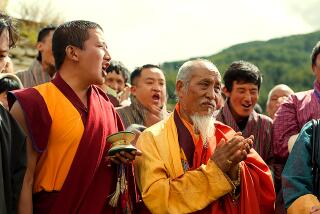‘The Cup’ Is a Rich Mix of Soccer, Life in Monastery
- Share via
What could be more surprising than “The Cup”? Not only is its country of origin unexpected (the East Asian kingdom of Bhutan not being previously known as a filmmaking center), so was its becoming the object of a mini-bidding war among independent distributors after its successful debut at the Directors Fortnight in Cannes.
Set in a Tibetan exile monastery, starring Tibetan monks and written and directed by a man described as “one of the most important incarnate lamas in the Tibetan Buddhist tradition,” “The Cup,” in fact the first feature ever made in Bhutan, is also surprising in its subject matter. Charming, slyly comic and far from conventionally religious, it shows what happens when, of all things, an intense case of World Cup fever infects a holy sanctuary.
Make no mistake, the monks in “The Cup” (filmed in Bhutan’s Chokling Monastery) are the real deal, genuine prayer-chanting, horn-blowing, gong-sounding, big hat-wearing, butter tea-drinking individuals who have made a decision to “take refuge in the Buddha.”
Based on a true story and written and directed at a leisurely pace by Khyentse Norbu, “The Cup” takes its time immersing viewers in the monastery’s world, allowing us to experience the slow rhythms of the place’s daily life.
Everything that happens, down to the way the monks wear their robes (“It’s a 2,500-year-old fashion,” one of them cracks), is steeped in the most ancient custom. But there is a place for playfulness as well as ritual, because even monks engage in food fights and general horsing around when young.
Just being a monk is different in this modern age, especially in a country in which the modernizing influence of India is very strong. Young monks are more worldly than their elders were at their time of life, and that creates the kind of push-pull between tradition and modernity that is at the center of “The Cup’s” appeal.
Making the monastery an especially intriguing place is filmmaker Norbu’s genial and unforced feeling for character. Everyone in the institution, from Geko the tireless disciplinarian to a deranged soothsayer who never washes his hair to the wry old abbot who longs to return to Tibet but fears it will never happen, is well defined in a way that helps fuel the story and is appealing in its own right.
Shot in a straightforward style by Paul Warren, “The Cup” has a neo-documentary feel that was enhanced by the way it was made. Having written his script in English for a non-English-speaking nonprofessional cast, Norbu briefed the actors on what they should be doing before each scene. “Dialogue was prompted and memorized on the spot,” the press notes inform, “and most scenes were completed within three takes or less--a testament to the actors’ monastic discipline and concentration.”
Lama Chonjor, the real-life abbot of Chokling Monastery, plays himself as an otherworldy type who is especially worried about a pair of young Tibetans who, a letter from a family member informs him, are attempting to sneak across the border and join his religious order.
The abbot confides his worries to his major-domo, the monastery’s hard-line Geko (played by Orgyen Tobgyal, a major lama in his own right), but this stern upholder of tradition has other things on his mind. It’s 1998, the World Cup is going on and the young monks have little else on their minds.
Most soccer-mad of all is 14-year-old Orgyen (Jamyang Lodro, Tobgyal’s real-life son). A relentless live-wire, Orgyen lives and breathes the World Cup, but with a Tibetan twist. His favorite player is Reynaldo (whose No. 9 jersey he wears under his robes), in part because the Brazilian’s head is shaved like a monk’s, and his favorite country is France because it’s the only nation to have spoken out for Tibetan rights.
A miniature hustler always looking for an angle, Orgyen will let nothing stand in the way of his watching the Cup games, while Geko is equally determined to uphold the monastery’s discipline. What happens when this miniature unstoppable force meets an apparently immovable object over the Cup final is the film’s charming centerpiece.
“The Cup” is not in a hurry to tell its story, but it wouldn’t be effective if it was. When the incongruity of World Cup soccer (“Two civilized nations fighting over a ball” is how Geko bemusedly describes it to the abbot) is joined to the incongruity of sports-crazed monks, the slow buildup creates wonders all its own.
* MPAA rating: G. Times guidelines: nothing objectionable.
‘The Cup’
Orgyen Tobgyal: Geko
Neten Chokling: Lodo
Jamyang Lodro: Orgyen
Lama Chonjor: Abbot
Godu Lama: Old Lama
Robbie Coltrane: Charlie
Released by Fine Line Features. Director Khyentse Norbu. Producers Malcolm Watson, Raymond Steiner. Executive producers Hooman Majd, Jeremy Thomas. Screenplay Khyentse Norbu. Cinematographer Paul Warren. Editor John Scott. Production design Raymond Steiner. Running time: 1 hour, 34 minutes.
In limited release.
More to Read
Only good movies
Get the Indie Focus newsletter, Mark Olsen's weekly guide to the world of cinema.
You may occasionally receive promotional content from the Los Angeles Times.











